Vonage has been a familiar name in the VoIP industry for many years. It built its reputation on simple phone plans and later turned toward cloud services for businesses. Many still find it easy to use and convenient, though the quality differs from place to place. Lately, some users say the service feels less reliable than before, and a few newer competitors now offer the same level of performance or better.
Let’s look at the best alternatives.
Best Vonage alternatives: A comparison
Here’s an overview of some alternatives to Vonage and their key features:
| Alternative | Price* (lowest tier) | Auto-dialer modes | Real-time dashboards and analytics | Answering machine detection | Local presence dialing | G2 user rating |
|---|---|---|---|---|---|---|
| Vonage | $19.99/mo | None | Advanced | Yes | No | 4.3 |
| MightyCall | $20/mo | Preview Power Predictive |
Advanced | Yes | Yes | 4.4 |
| Ooma | $19.95/mo | Preview | Basic | No | No | 4.6 |
| RingCentral | $30/mo | Preview Power Predictive | Advanced | Yes | No | 4.0 |
| Nextiva | $23/mo | Preview Power Predictive |
Advanced | Yes | Yes | 4.5 |
| Quo (formerly OpenPhone) | $19/mo | None | Basic | No | No | 4.7 |
| Dialpad | $27/mo | Salesforce Power | Advanced | Yes | Yes | 4.4 |
| Aircall | $40/mo | Power | Advanced | No | No | 4.4 |
| AVOXI | $14.99/mo | None | Advanced | No | Yes | 4.4 |
| CloudTalk | $34/mo | Preview Power Predictive |
Advanced | Yes | Yes | 4.4 |
| Google Voice | $10/mo | None | Basic | No | No | 4.1 |
How we evaluated these alternatives to Vonage for business
We’ve selected important criteria in our rankings of the best alternatives to Vonage. Let’s have a look:
- Features: Arguably, the most essential aspect of a telephony company is the features it offers.
- Price and availability: Service providers often offer tiered pricing. Some competitors are not necessarily better, but some could be significantly so.
- The possibility of integration: As the internet becomes increasingly interconnected with our lives, integration is becoming more important than ever.
- Total cost (including add-ons): Sometimes, price can be a tricky metric to evaluate. The flat price typically covers the program itself; however, some of these companies don’t include everything listed in the original price.
- Call quality: The quality of a call matters. The other features are crucial, of course, but the phone company’s call service is still the most important thing.
- User support: Even the top alternatives can still cause issues. It’s crucial to have a support staff that can help you iron out those errors.
What is Vonage?
Based in New Jersey, the company was founded in 1998 under the name Min-X and focused on residential VoIP services. In 2001, it was rebranded as Vonage.
Now a cloud communications provider and part of Ericsson, Vonage supports more than 100,000 businesses worldwide. Its offerings include voice, messaging, video, contact center solutions, and communication APIs. Since joining Ericsson in 2022, the platform has expanded its suite of features and services for business clients.
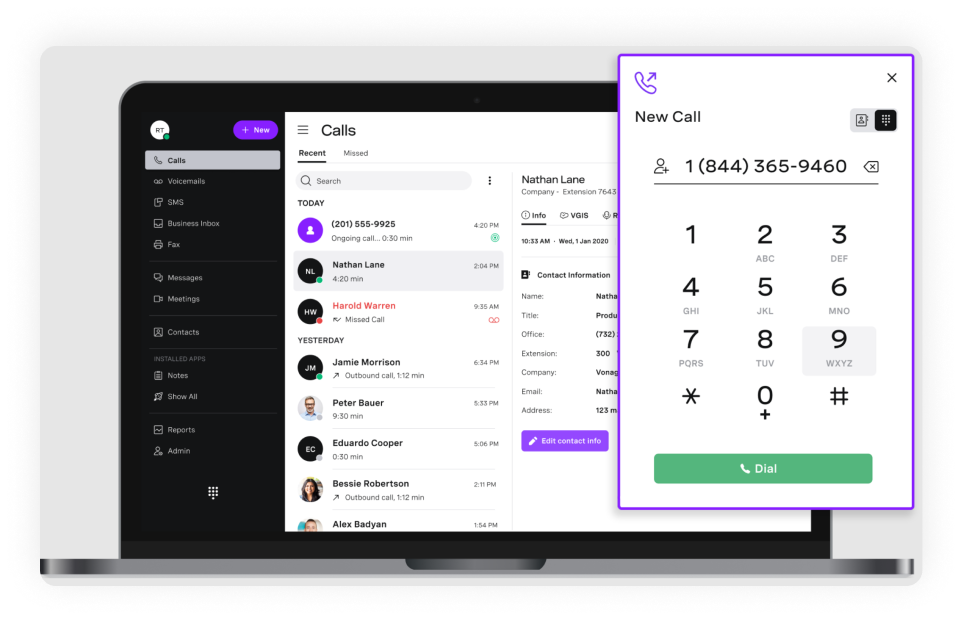
Key features
- Answering machine detection
- Call handling and forwarding
- Call queues
- Group calling
- Call recording
- Admin dashboard for managing users
Integrations
- Microsoft Dynamics
- Google Workspace
- Salesforce
- Slack
- NetSuite
Pricing
- Mobile: $19.99/extension/month
- Premium: $29.99/extension/month
- Advanced: $39.99/extension/month
- Call center plans: upon request
Free trial
Vonage does not offer a trial period.
Why businesses choose Vonage
Many businesses choose Vonage because it combines flexibility, scalability, and a comprehensive range of communication features that meet the practical needs of the workplace.
- Multi-channel communication: Vonage combines voice, messaging, video, and social channels into a single platform. Teams handle all interactions in a single place, reducing the need for multiple tools and ensuring clear and concise communication.
- Developer tools and APIs: The platform offers a comprehensive set of APIs that enable companies to customize workflows and integrate communication features directly into their systems.
- Scalable infrastructure: Vonage supports both small teams and large enterprises. It accommodates multiple users and locations, adapting as a business grows without interrupting operations.
- User-friendly management: Administrative controls and setup options make onboarding, user management, and device configuration straightforward.
- Many companies like Vonage operate in the communication space, but Vonage has still carved out its own audience that appreciates its features and reliability.
Why consider Vonage alternatives?
Vonage has a good reputation in the VoIP and unified communications market, but some businesses search for competitors because certain challenges persist. Feedback from users on G2 and online forums shows a few recurring issues:
No auto-dialers
Many businesses, particularly sales teams and contact centers, rely on auto-dialers to efficiently manage large volumes of outbound calls. Vonage (even in its call center plans) doesn’t include a built-in auto-dialer, so teams must rely on manual dialing or third-party integrations to handle mass outreach.
No local presence dialing
Vonage doesn’t offer local presence dialing, a feature many sales and outreach teams rely on to appear as a local caller. Without it, businesses may face lower engagement and response rates on outbound calls.
Pricing and hidden fees
Users frequently report unexpected charges, such as additional costs for features that some Vonage alternatives include by default, like AI assistance or advanced SMS capabilities. People also note that some of Vonage’s most useful features, such as call groups, on-demand call recording, and visual voicemail, are only available on the highest-tier plans.
Variable customer support and service experience
Although the main platform functions reliably, businesses report that obtaining help can take longer than expected. Customer support responses vary, and resolving technical or account issues may require multiple follow-ups.
Interface quirks and implementation hurdles
Some users say that the platform offers robust capabilities, but its administration portal feels outdated, and setup, especially for larger deployments, is less smooth than expected. These hurdles make onboarding and everyday management frustrating.
10 top alternatives to Vonage: An overview
Now, we’ll take a closer look at the best Vonage alternatives for business.
1. MightyCall
MightyCall is a user-friendly VoIP platform designed to help small businesses, startups, and remote teams manage calls with ease and professionalism. It offers a reliable cloud-based solution with powerful features that make communication simple, whether your team is in the office or working from different locations.
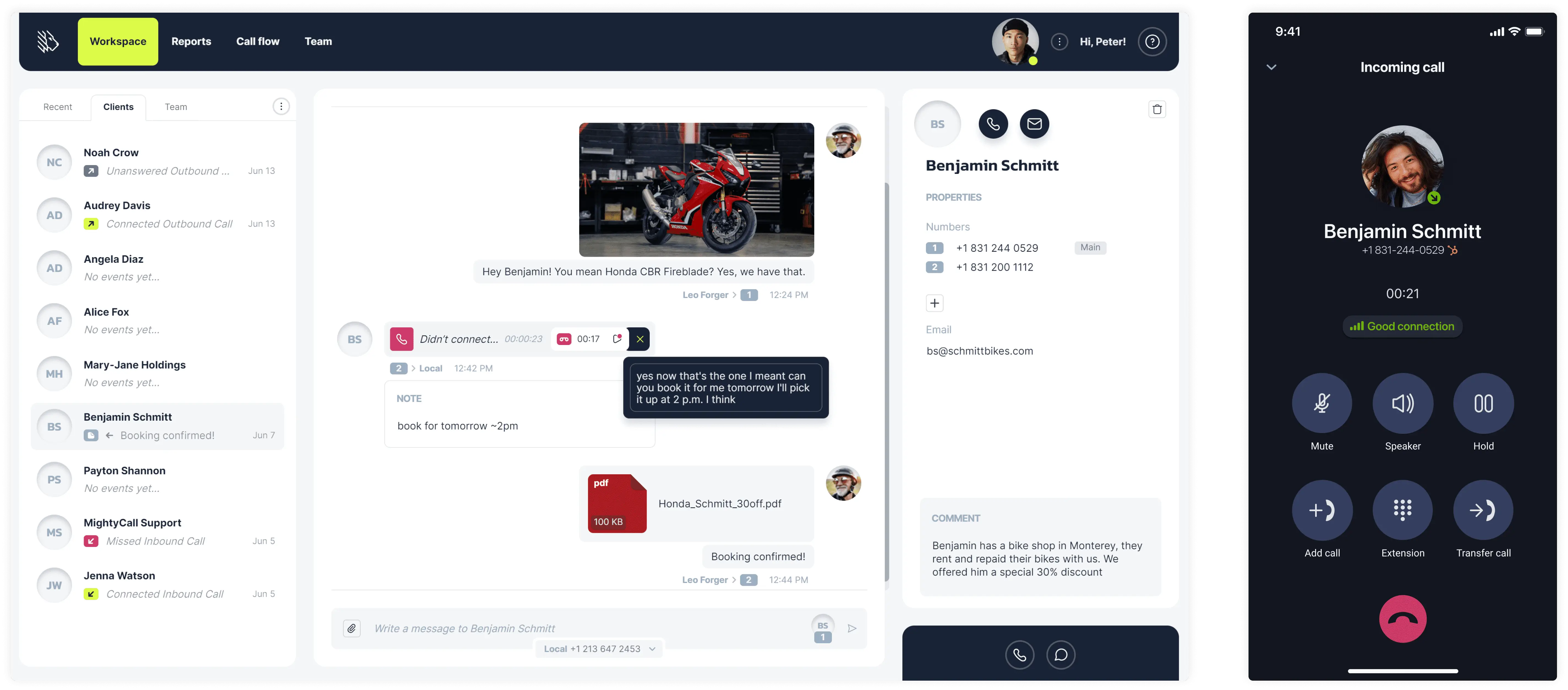
Features
- Fully customisable call routing
- Call recording
- Call queues
- Voicemail-to-text
- Voicemail drop
- Multi-level IVR
- Live call monitoring: call listening, barging, whisper, intercept
- Auto dialers: 10-line per agent predictive, power, and preview modes
- AI answering machine detection with a 97% accuracy
- Local presence dialing
- DID reputation
- Caller ID whitelisting
- Real-time analytics
- AI call summary
- Business phone extensions
- Call recording
- Call waiting
Integrations
All major CRMs
Pricing
- Core: $20/mo/agent, billed annually
- Pro: $38/mo/agent, billed annually
- Power: $65/mo/agent, billed monthly
- Enterprise: Custom price
Free trial
MightyCall offers a 7-day trial.
Support channels
- Live chat offers quick help right from the dashboard, providing instant answers when you need them.
- Email support lets you send more detailed questions and get helpful responses, usually within a business day.
- The knowledge base has FAQs and step-by-step guides so you can find answers anytime.
- Phone support is available if you want to talk through an issue with a real person.
What makes it better than Vonage?
- Lower starting prices make it friendly for new or smaller businesses.
- The interface is simple and easy to use, especially for folks without tech backgrounds.
- Setting up remote teams is a breeze. Everyone can get started quickly without IT help.
- Integrations are focused on popular tools small businesses already use, making workflows smoother.
MightyCall limitations
Some advanced features for large businesses might be missing or limited.
Third-party integrations aren’t as broad as what you’d find with some bigger VoIP providers.
What customers are saying
Many G2 customers like how easy MightyCall is to set up and use, with special praise for its customer support and call management features. Some say it’s great for keeping things simple and professional, though a few wish there were more integrations or note rare technical hiccups during busy times.
Best for
MightyCall is ideal for small businesses, entrepreneurs, and remote teams looking for a simple, flexible, and affordable way to manage business calls.
schedule your personalized demo with our amazing team

2. Ooma
Ooma is one of the best Vonage alternatives, allowing teams to handle calls, messages, and online collaborations. Ooma, Inc., the US company behind it, was founded in 2004 and is based in Sunnyvale, California. It started with home phone services before expanding to serve small and medium-sized businesses.
The platform operates on Ooma’s VoIP network, offering nationwide coverage, and is compatible with both desktop computers and mobile devices.
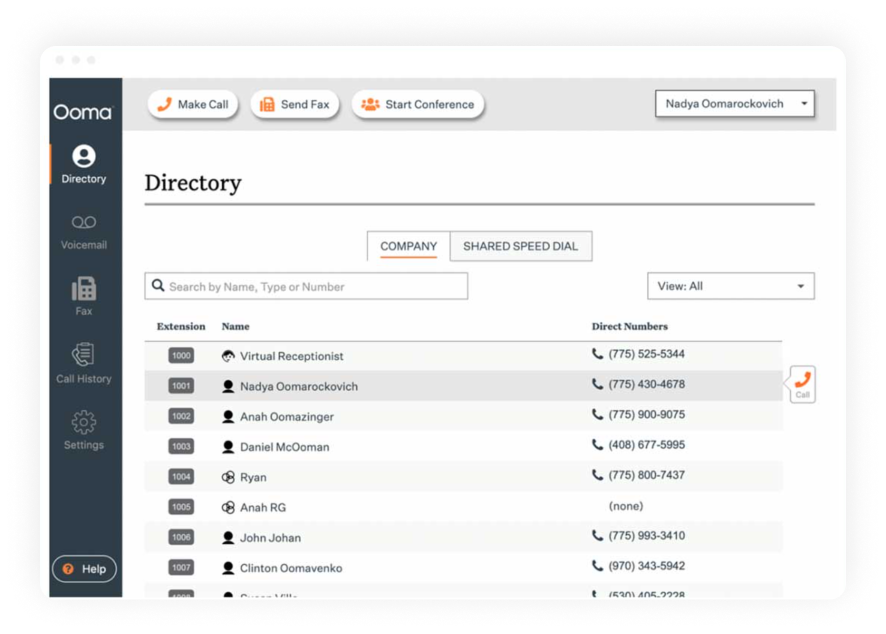
Features
- Preview dialer
- Virtual receptionists
- Call forwarding and transfers
- Ring groups
- Conference calling
Integrations
- HubSpot
- Salesforce
- Microsoft Dynamics
- Freshdesk
Pricing
- Essentials: $19.95/user/month
- Pro: $24.95/user/month
- Pro Plus: $29.95/user/month
Free trial
There is no standard free trial, but you can use all features for 30 days with a money-back guarantee.
Support channels
Ooma offers live chat and email support during business hours, with 24/7 phone assistance for urgent issues. Users can also explore the help center, community forums, and step-by-step guides to get started and manage common tasks.
What makes it better than Vonage?
- Inclusive pricing and feature access: Ooma’s plans bundle essential business tools across standard tiers, so teams can use ring groups and visual voicemail without upgrading to expensive packages.
- Efficient outbound calling: Ooma’s preview dialer and call management features streamline outbound communications. This is particularly useful for sales and support teams that manage high call volumes.
- Intuitive setup and management: Unlike Vonage, this platform’s interface is user-friendly, which makes onboarding new users and configuring devices straightforward.
- Reliable support and guidance: Ooma helps users resolve issues quickly and make full use of the platform.
Ooma limitations
- Limited advanced analytics: Ooma lacks deeper insights and customizable dashboards that larger sales or support teams need for performance tracking.
- Fewer integration options: It supports common CRMs and collaboration tools, but doesn’t have as wide a range of integrations as some competitors, which can limit workflow automation.
- International calling restrictions: The platform primarily serves U.S.-based users; international coverage is limited.
- Hardware dependency for some features: Certain call management functions work best with Ooma’s proprietary devices, which increases upfront costs and complicates setups for businesses that prefer BYOD (bring your own device).
What customers are saying
G2 rating: 4.6/5.0
Users note that Ooma Office is easy to set up, works smoothly with its own phones, and lets them handle calls from anywhere through the app.
At the same time, many mention call drops or echoes, phones needing restarts, and slow or unclear support when billing or service issues occur.
Ooma is cost effective, easy to use, reliable solution. -
Best for
Small teams and individual users who are looking for a simple phone system with optional devices.
3. RingCentral
RingCentral, founded in 1999 and headquartered in Belmont, California, is one of the most prominent alternatives to Vonage, known for its call center software. The platform offers a comprehensive package for phone calls, text messages, and team collaboration, and it adapts to the needs of businesses of all sizes.
RingCentral operates across North America, Europe, Asia, and Australia, and serves millions of users worldwide with reliable connectivity and flexible tools.
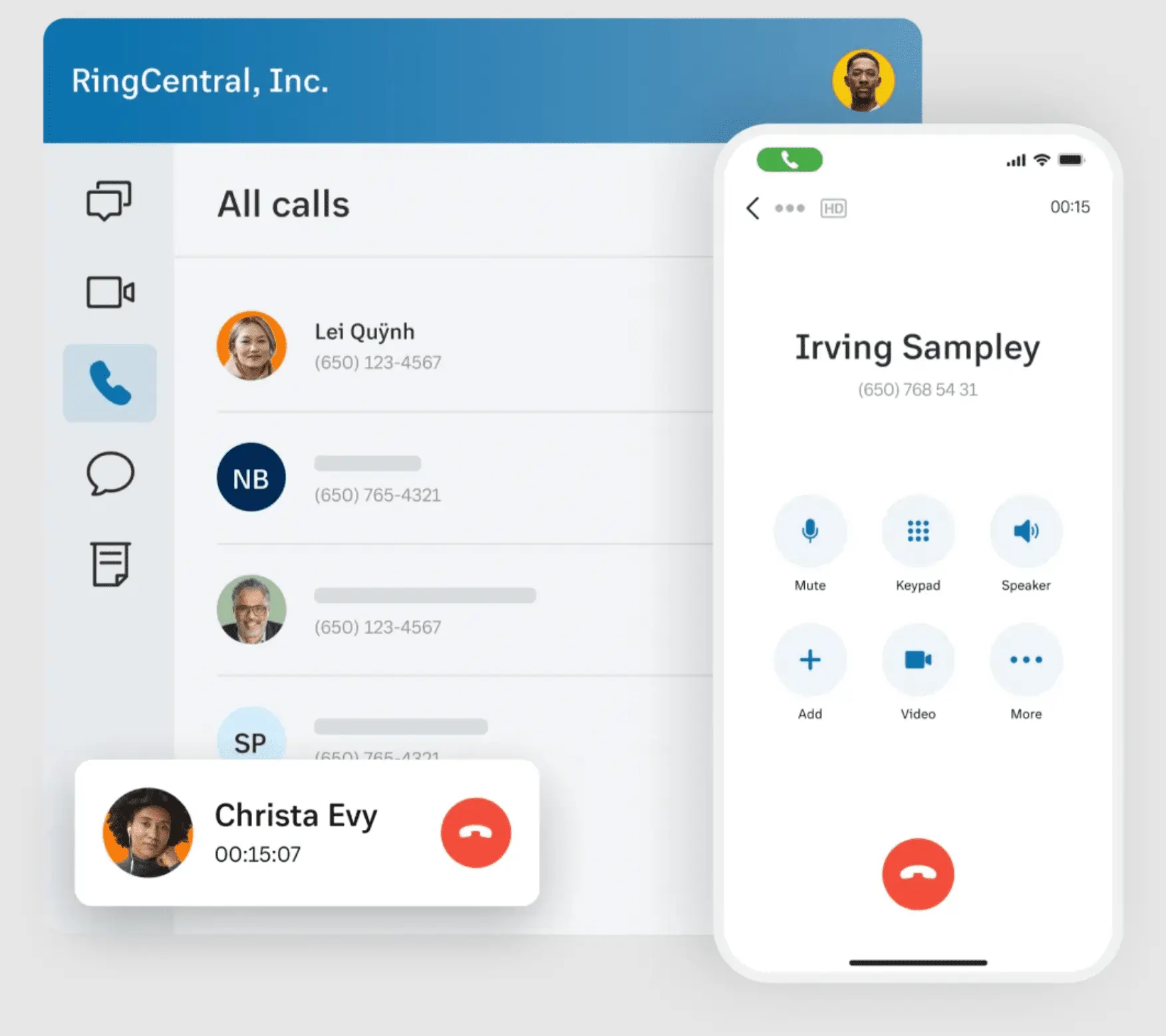
Features
- Predictive, power, and preview dialers
- Answering machine detection
- Custom call menus
- Group calling
- Unified inbox
- Visual voicemail
Integrations
- Salesforce
- Microsoft Teams
- Google Workspace
- HubSpot
- Zendesk
Pricing
- Core: $30/user/month
- Advanced: $35/user/month
- Ultra: $45/user/month
Free trial
The service offers full access for 14 days at no cost.
Support channels
Users can reach support through phone, email, or live chat. Many find the team helpful, though response times can be slow.
What makes it better than Vonage?
- Broader, deeper integrations: RingCentral supports hundreds of pre‑built integrations with major CRMs and productivity tools, which allow businesses to connect workflows across platforms.
- More advanced analytics and reporting: Provides richer real‑time data, customizable dashboards, and actionable insights out of the box to give organizations better visibility into performance.
- Greater built‑in feature value: Many features that Vonage offers only as paid add‑ons are included by default in RingCentral’s packages. This reduces hidden costs and feature‑surprise risks.
RingCentral limitations
- Steeper learning curve: RingCentral’s rich feature set and customizable options can take administrators and users time to fully understand, especially in larger organizations with complex workflows.
- Occasional service reliability issues: Some users report occasional call drops or latency, particularly during peak usage times, which can affect high-volume customer support or sales operations.
What customers are saying
G2 rating: 4.0/5.0
Users say RingCentral is reliable, easy to use, and works well across devices for both office and remote teams. They like its quick setup, clear calls, and useful tools like recordings and integrations.
Some mention occasional slowdowns, uneven call quality, and outages, and others find support inconsistent or the system a bit overloaded with features.
I find the quality of the calls to be inconsistent. Sometimes the call quality is low or medium, which seems to depend on the internet connection and service provider. -
Best for
Teams with extensive communication needs across multiple users.
4. Nextiva
Nextiva, founded in 2008 and headquartered in Scottsdale, Arizona, is a communication platform for businesses. Over time, it has expanded to accommodate companies of all sizes, from small startups to large enterprises across North America.
Now, it is a top Vonage alternative. More than 150,000 organizations rely on Nextiva to manage voice calls, video conferences, team messaging, and customer interactions within a single platform.
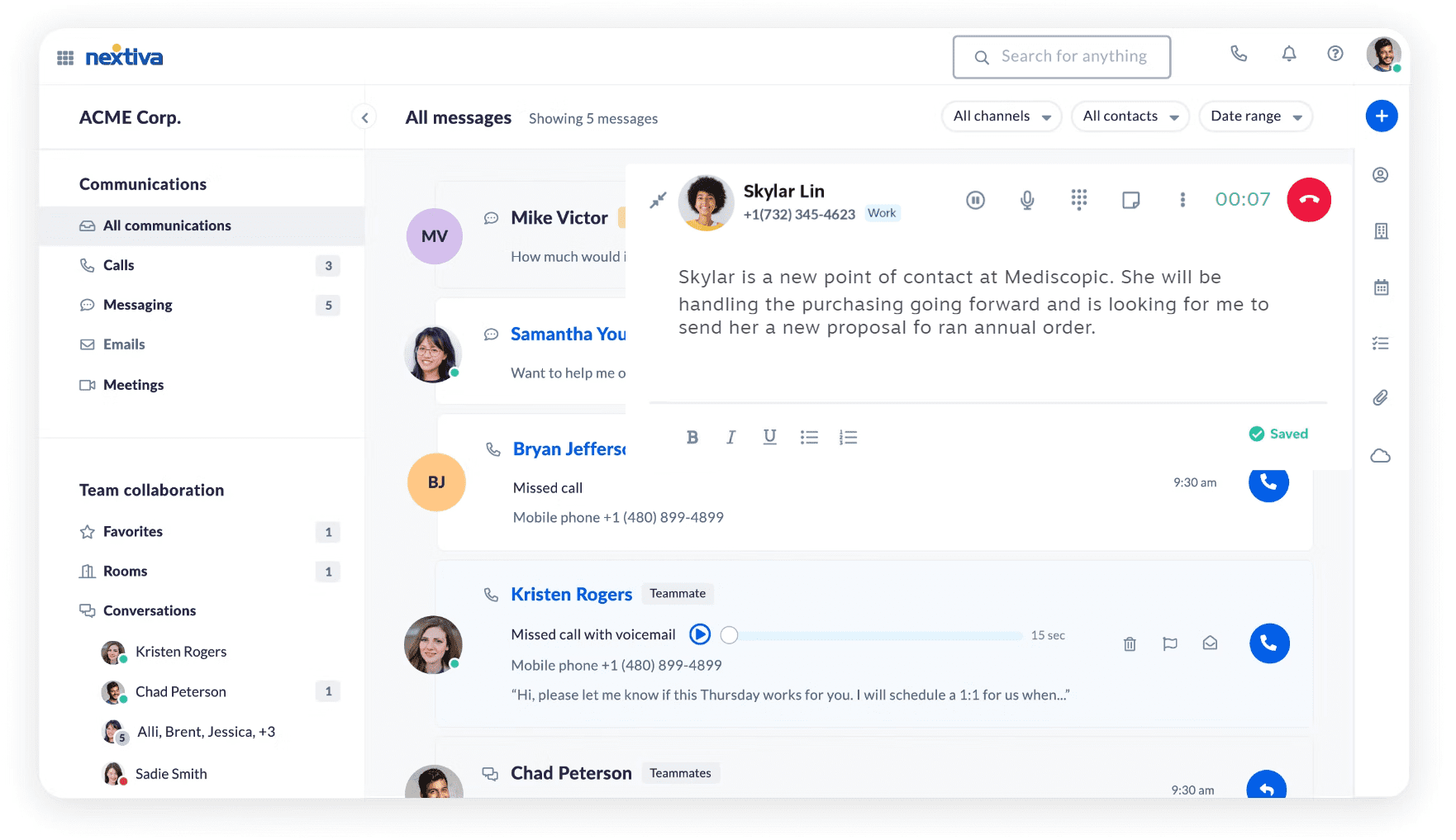
Features
- Preview, power, and predictive dialers
- Answering machine detection
- Local presence dialing
- Interactive voice response with AI support
- Call recording with rating options
- Conference call bridge
Integrations
- Google Workspace
- Microsoft Teams
- Salesforce
- Zoho
- Zendesk
Pricing
Small business:
- Core: $23/user/month
- Engage: $50/user/month
- Power Suite: $75/user/month
Enterprise:
- Essential: $75/user/month
- Professional: Available on request
- Premium: Available on request
Free trial
A 30-minute demo provides a hands-on look at the product, even though a free trial is not available.
Support channels
Users can reach Nextiva support by phone anytime, via live chat during business hours (5 a.m.- 6 p.m. weekdays, 5 a.m.- 4 p.m. weekends MST), or through email tickets. Phone and chat assistance is usually prompt and dependable.
What makes it better than Vonage?
- Dependable call quality: Users report consistently clear and reliable calls (critical for sales, support, and high-volume communication teams).
- Better-built-in analytics & collaboration tools: This alternative offers unified workspaces, higher video participant limits, and detailed analytics, helping companies scale their operations without relying heavily on separate tools.
- Simple management for admins: The platform’s interface makes onboarding, user management, and configuration straightforward, saving time and reducing errors.
Nextiva limitations
- Higher pricing for advanced plans: Some of Nextiva’s most powerful features, like AI tools and skill-based routing, are only available in higher-tier plans.
- Feature complexity for new users: The platform offers many advanced options, which can be overwhelming for teams without dedicated IT support.
- Limited international calling inclusions: Domestic calling is strong, but international rates make the platform less ideal for globally distributed teams.
What customers are saying
G2 rating: 4.5/5.0
Users like how easily Nextiva connects calls, chats, and meetings across multiple locations, with a simple dashboard and responsive team.
Some note small issues: app freezes, setup delays, or complex features, but most say these are minor compared to its reliability and service.
The only thing I don't like is the Spam call blocking; it recognizes and identifies them but doesn't block them permanently. -
Best for
Teams of any size that are looking for a unified solution for voice, text, and video communication.
5. OpenPhone
OpenPhone, now known as Quo, is a VoIP phone system founded in 2018 and based in San Francisco. As one of the simplest and most reliable Vonage competitors, it provides a unified solution for calls, texts, and business communication.
Serving more than 60,000 businesses, the platform highlights the shift of small and growing companies to cloud-based communication. Like Vonage, OpenPhone works on both desktops and mobile devices.
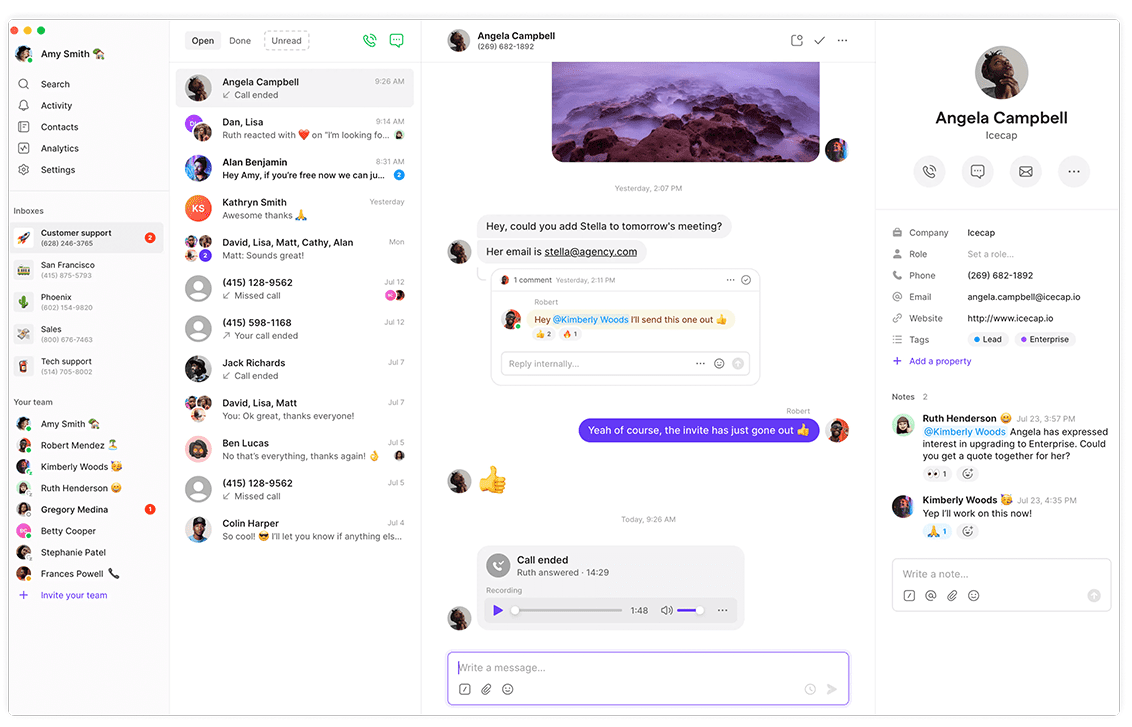
Features
- Call routing
- Auto attendant
- Voicemail-to-text
- Call recording
- AI-generated summaries, transcripts, and tags, with 24/7 support from Sona
Integrations
- HubSpot
- Salesforce
- Slack
- Gong
- Zapier
Pricing
- Starter: $19/user/month
- Business: $33/user/month
- Scale: $47/user/month
Free trial
Users can try the service for free for 7 days.
Support channels
The platform offers weekday assistance through email and live chat, complemented by a knowledge base. Users usually hear back within a single day.
What makes it better than Vonage?
- Affordable access to essential features: OpenPhone includes Sona AI agent, shared contacts, and user roles and management, even on its entry-level plans.
- AI-powered call insights: With AI-generated summaries, transcripts, and tags, OpenPhone helps teams quickly review and act on conversations, a feature Vonage does not offer.
- Simpler setup and management: OpenPhone’s interface is intuitive for small and growing teams, making onboarding and user management easier and better than Vonage’s more complex administration portal.
- Faster support response: OpenPhone offers same-day email and live chat assistance.
OpenPhone limitations
- Limited international calling options: OpenPhone primarily focuses on the US and Canada, so global teams face restrictions for international calls.
- Fewer advanced analytics: Despite AI-generated call summaries, it lacks the in-depth reporting and customizable dashboards that larger teams require for performance tracking.
- Limited hardware options: Some businesses that prefer dedicated desk phones will find fewer supported hardware options compared to more traditional VoIP providers.
What customers are saying
G2 rating: 4.7/5.0
Quo makes communication easy to manage. It helps teams stay organized by keeping shared notes and messages in one space.
Some mention missing options like RCS messaging, limited automation, or small app delays, but most find Quo reliable, clear, and simple to use for everyday communication.
Not really much to dislike here, if I had one thing I could add is a customized voicemail feature, which they may have but I have not set up yet, as well as the ability to send out text messages from the Quo line members can set up. -
Best for
Groups that handle client communication and require both phone service and essential CRM capabilities.
6. Dialpad
Dialpad is a cloud-based platform that combines voice calls, video conferencing, and team messaging into a single system. It serves businesses of all sizes and provides tools to streamline communication, enhance collaboration, and deliver performance insights.
The platform also uses AI features, such as playbooks, recaps, scorecards, transcriptions, and more.
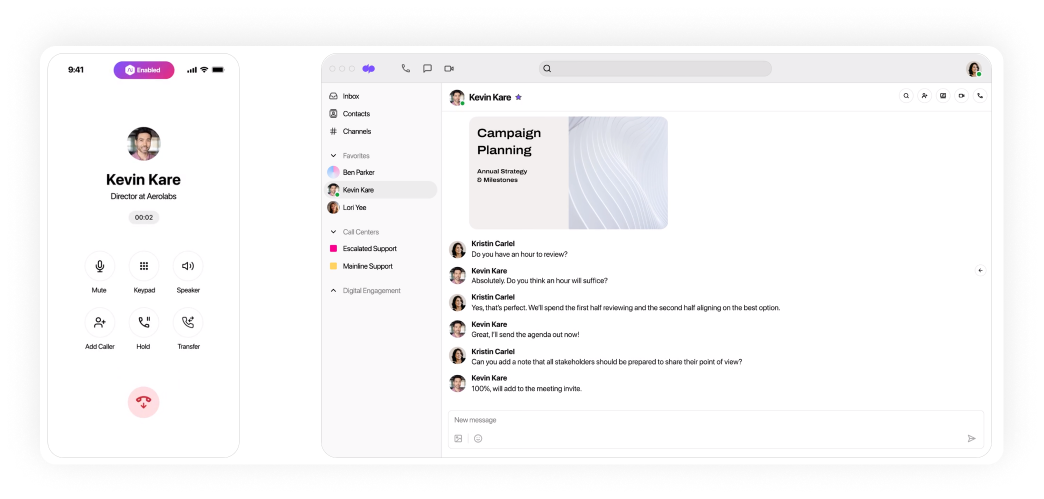
Features
- Salesforce dialer
- Answering machine detection
- Local presence dialing
- IVR system
- Customer callbacks
- Call quality & tagging
- Team messaging
- AI agent
Integrations
- Salesforce
- Microsoft Dynamics
- Freshdesk
- Front
- Zapier
Pricing
- Standard: $27/user/month
- Pro: $35/user/month
- Enterprise: Custom
Free trial
Users have 14 days of free access to the platform.
Support channels
Support is offered through email and tickets on all plans, with a help center for self-service. Pro and Enterprise users also have access to round-the-clock chat and phone assistance.
What makes it better than Vonage?
- Built‑in AI‑driven intelligence: Dialpad delivers real‑time transcription, sentiment analysis, and searchable call logs, which help teams extract insights instantly.
- Faster call analytics and insights: With dashboards showing performance metrics, call patterns, and actionable items, Dialpad helps customer‑facing teams work more efficiently.
- Integrated messaging: Teams can exchange texts, notes, and reminders alongside calls, reducing the need for external communication tools and keeping workflows centralized.
- Scalability for larger teams: Dialpad makes it easy to add users, manage extensions, and maintain consistent communication across departments.
Dialpad limitations
Higher cost for advanced plans: Some features, like Salesforce dialer and advanced reporting, require higher-tier subscriptions, which can be expensive for smaller teams.
Learning curve for AI and automation features: Users may need time to understand and apply them effectively, especially without prior experience.
Limited call center functionality: Dialpad’s contact center tools fall short of those offered by some competitors. It lacks live monitoring and only includes a Salesforce power dialer, with skill-based routing or detailed queue customization reserved for higher-tier plans.
What customers are saying
G2 rating: 4.4/5.0
Users like Dialpad’s built-in AI for call transcripts, meeting summaries, and action items, as well as its easy access across devices and integrations.
Some mention app glitches, dropped calls, or setup issues with Microsoft integration, but most see Dialpad as a reliable and modern platform.
What I like best about Dialpad Connect is its user-friendly interface, which makes managing calls and messages simple and intuitive. -
Best for
Teams with heavy call workloads that require a unified approach to customer interactions.
7. Aircall
Aircall, founded in 2014 in Paris, France, offers a cloud-based platform for calls and text messages. It integrates with popular CRMs and helpdesk tools to provide a single place for customer interactions. The interface emphasizes simplicity and clarity, and the platform supports teams with customers in multiple countries.
With offices in Paris, New York, Madrid, and Sydney, Aircall serves over 20,000 businesses worldwide.
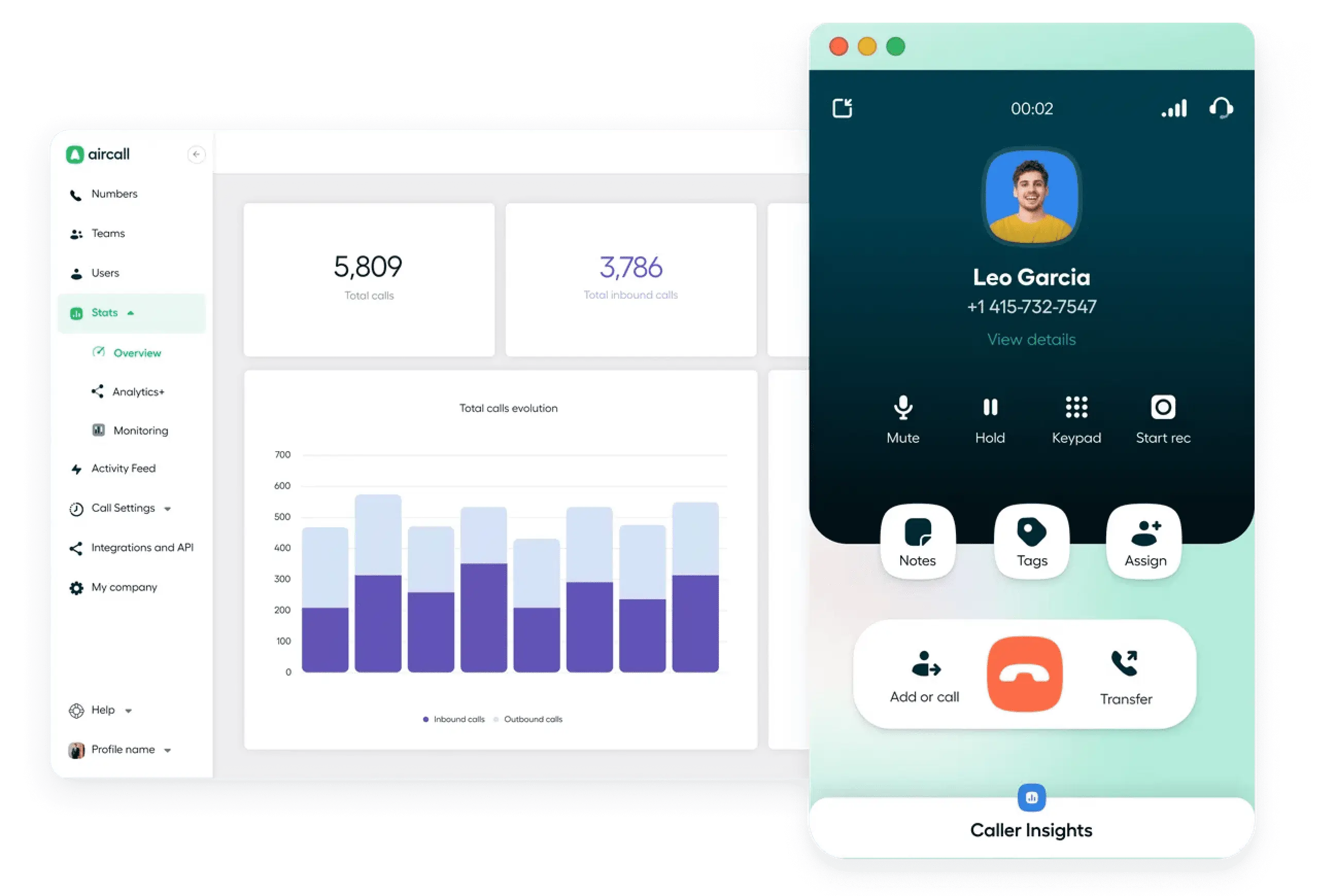
Features
- Power dialer
- Automated call routing
- Callback queue management
- Warm call transfer
- Call recording and transcription
- Live monitoring
Integrations
- Salesforce
- HubSpot
- Zendesk
- Gong
- Zapier
Pricing
- Essentials: $40/user/month
- Professional: $70/user/month
- Enterprise: Custom
Free trial
Aircall offers new users a 7-day trial period.
Support channels
All Aircall plans include 24/5 support through email, a help center, and an AI assistant. Live chat is available on selected plans.
What makes it better than Vonage?
- Extensive CRM & tool integrations: Aircall supports over 100 pre-built integrations, providing richer connectivity across users’ tech stacks.
- Designed for sales and support workflows: Offers outbound-centric features (e.g., power dialer, IVR, call-queuing, and live analytics) for teams managing high call volumes.
- Faster time to value & simple onboarding: Emphasizes quick setup and configuration, making it suited for businesses that need to get communications up and running quickly.
- Transparent value-pricing for feature-rich plans: While not the lowest cost, Aircall positions itself with clear tiers that bundle analytics, routing, and agent tools in standard plans.
Aircall limitations
- No predictive dialing: Like Vonage, Aircall doesn’t support predictive dialing, which limits efficiency for outbound call centers.
- No video or unified communication options: Focuses mainly on voice and call management, so it lacks built-in video meetings or team chat, requiring separate apps for full collaboration.
- Higher cost for advanced features: Accessing features like advanced analytics, call monitoring, or custom integrations can quickly increase costs for growing teams.
What customers are saying
G2 rating: 4.4/5.0
Aircall offers clear call quality, quick setup, and an interface that feels simple from the start. Many appreciate useful AI summaries and tagging for workgroups.
Some users report minor bugs, text syncing issues, or higher pricing for smaller teams. Others mention occasional call drops or minor lags.
We recently switched over to Aircall from another phone platform. It’s still very new to me, but so far, I find it a bit hard to navigate. It’s not as user-friendly as I expected, and it doesn’t seem to have everything in one place like our previous system did. -
Best for
Teams that need a flexible phone system compatible with multiple tools for global work.
8. AVOXI
AVOXI is a cloud phone alternative that gives businesses complete control over their communications. Based in the United States, it has more than 20 years of experience and serves over 5,000 companies globally, with coverage in more than 150 countries.
The platform provides tools to enhance call quality and management and integrates with existing contact centers, communication applications, and over 40 CCaaS, UCaaS, and CPaaS solutions.
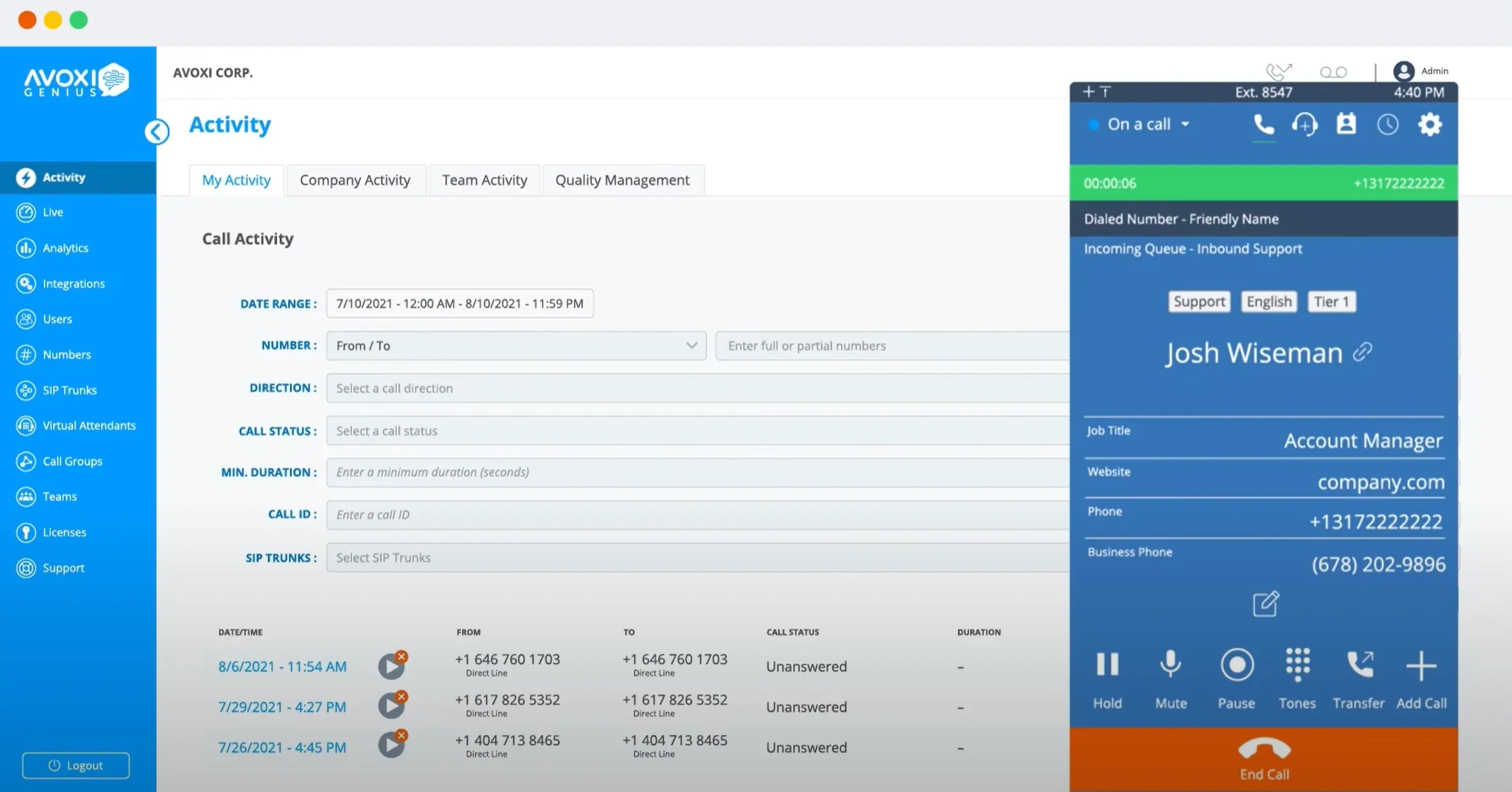
Features
- Local presence dialing
- Call flow builder
- Real-time traffic metrics
- Geographic reporting
- Fraud monitoring
Integrations
- Salesforce
- HubSpot
- Pipedrive
- Zoho
- Zendesk
Pricing
- Standard: $14.99/month
- Premium: $99.99/month
- Premium AI: $199.99/month
Free trial
No free trial is mentioned.
Support channels
AVOXI offers support 24/7/365 via toll-free phone lines in 20 languages. Users can also submit a contact form to schedule a call or receive a response by email.
What makes it better than Vonage?
- Broader global presence & virtual number coverage: AVOXI offers virtual and toll-free numbers in over 150 countries, helping businesses establish a local presence worldwide.
- Enterprise-grade voice infrastructure: The platform supports SIP trunking, cloud-based voice routing, and carrier-grade global voice delivery.
- Lower international call and number costs: AVOXI’s international rates and number fees are more competitive than many providers.
AVOXI’s limitations
- Fewer automation tools: The platform lacks broader workflow automation features, such as automatic call tagging, predictive dialers, or smart routing based on agent skills.
- Complex pricing at higher tiers: Although entry pricing is attractive, the cost of premium features like AI support or advanced routing increases quickly. Businesses scaling across multiple regions may need to manage several add-ons.
- Integration setup can take time: Setup and synchronization are not always straightforward, which can delay onboarding for teams with large data systems.
What customers are saying
G2 rating: 4.4/5.0
Some users say AVOXI provides clear calls, stable global connections, and simple number management. Others note that support is quick to fix smaller issues.
However, some mention unclear pricing where real costs exceed quotes, along with poor customer service, slow responses, and major trouble canceling or porting numbers.
Its User interface is very good, and the call connectivity is like most. -
Best for
Support teams, call centers, and organizations with global reach.
9. CloudTalk
CloudTalk, founded in Slovakia in 2016, is one of the most reliable and scalable Vonage alternatives. The cloud contact center supports sales and support teams and serves over 4,000 businesses worldwide. It provides international calling, AI tools, and automation to help teams manage conversations across multiple markets.
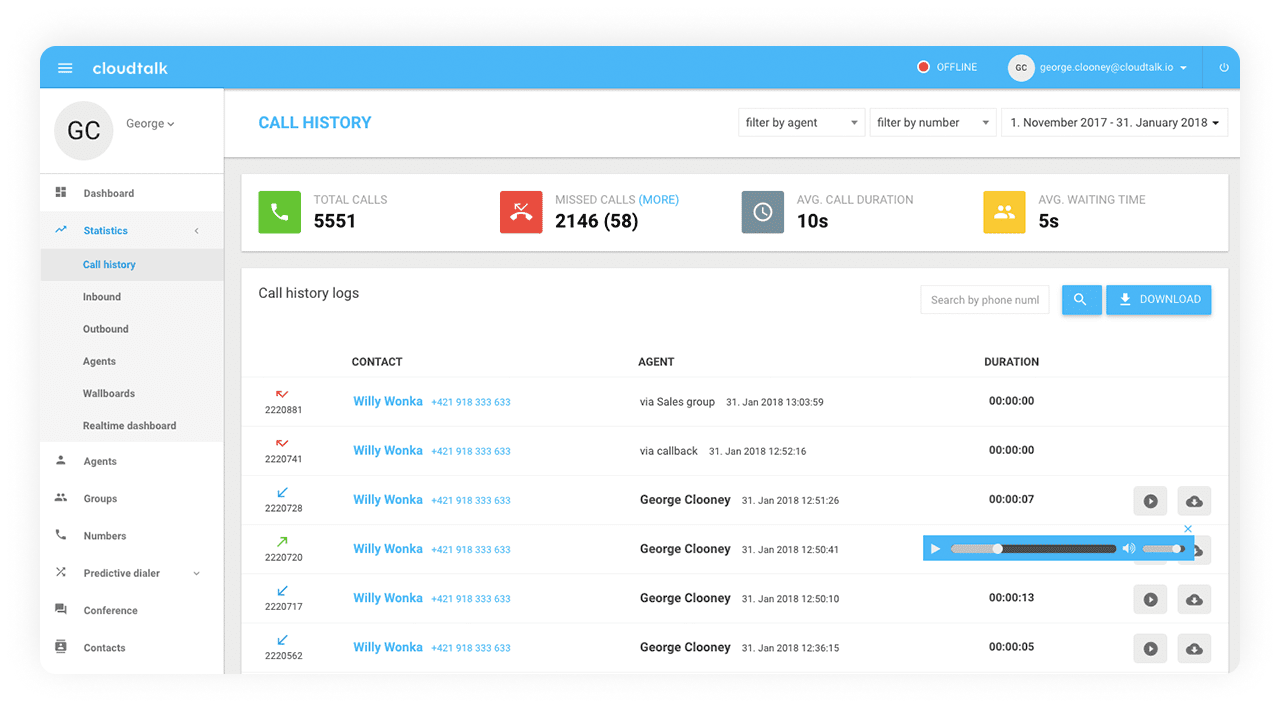
Features
- Preview, power, and predictive dialers
- Answering machine detection
- Local presence dialing
- Ring groups
- AI agents and voicemail
- Call transcripts and summaries
Integrations
- Pipedrive
- Zoho
- Zendesk
- Intercom
- Zapier
Pricing
- Starter: $34/user/month
- Essential: $39/user/month
- Expert: $69/user/month
Free trial
CloudTalk provides a 14-day trial.
Support channels
Support is available via phone (with multiple local lines), email, and a help center with detailed guides.
What makes it better than Vonage?
- Advanced analytics and reporting: CloudTalk provides detailed call insights and real-time dashboards that help teams monitor performance more closely.
- Wider global reach: It supports local numbers in over 160 countries, which gives businesses a stronger international presence and more reliable global call quality.
- Clear, inclusive pricing: Key features like call recording, ring groups, and a visual call builder come standard across CloudTalk’s plans, making it better than Vonage in terms of value.
CloudTalk limitations
- Limited outbound automation: CloudTalk lacks some advanced outbound automation tools, which can slow down high-volume sales or support teams.
- Fewer built-in AI tools: Unlike some newer platforms, CloudTalk doesn’t include AI-driven transcription or conversation insights in its standard plans (at least not yet).
- Higher cost for full functionality: Access to advanced analytics, integrations, or automation often requires higher-tier plans, which can add up for larger teams.
What customers are saying
G2 rating: 4.4/5.0
Users say CloudTalk is reliable and simple to use. They value its clear call quality, easy setup, and helpful tracking features for managing sales and support calls.
Some mention slight lags when syncing data or handling many calls, limited reporting options, and pricing that can feel high for small teams.
I really like how easy it is to use and how quickly you can set up everything. The interface is intuitive, and it helps me manage calls and track performance efficiently. -
Best for
International teams handling high call volumes and using CRM and automation tools.
10. Google Voice
Google Voice for Business is a cheap alternative from Google in the phone service market, relaunched in 2018 as part of Google Workspace. The service works within Google’s ecosystem, compatible with Gmail and Google Meet, and receives regular updates. Users manage it through a web application similar to Gmail, or via Android and iOS apps.
Used by millions of Workspace customers mostly in the US, it also offers international calling.
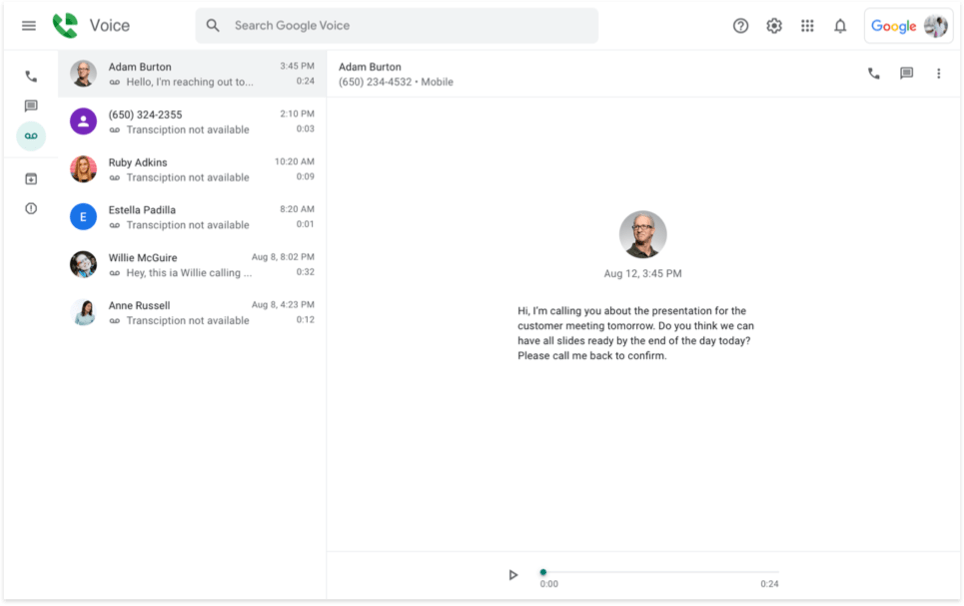
Features
- Auto attendant
- Call forwarding
- Ring groups
- Call recording
- Usage reports
Integrations
- Gmail
- Google Calendar
- Google Meet
- Google Workspace
Pricing
- Starter: $10/user/month
- Standard: $20/user/month
- Premier: $30/user/month
Free trial
Google Voice is not available for standalone testing, and it is not part of the 14-day Workspace trial.
Support channels
Support for Google Voice includes a help center with guides, email and ticket options, and priority assistance on advanced Workspace plans.
What makes it better than Vonage?
- More cost-effective pricing: Google Voice’s entry-level plans start at $10 per user/month, making it a more budget-friendly option for smaller teams.
- Integration for Google Workspace users: The system integrates natively with Gmail, Google Calendar, and other Workspace tools, meaning a unified experience for those already using Google.
- Streamlined setup and user interface: Unlike Vonage, Google Voice’s interface is simple and intuitive, making it easy for small businesses to get up and running with minimal complexity.
Google Voice limitations
- Limited advanced calling tools: Google Voice lacks analytics dashboards and queue management that many modern business phone systems now consider standard.
- No dedicated trial period: There is no standalone testing period, which makes it harder for teams to evaluate the service before purchase.
- Not ideal for large call centers: The system suits small teams but lacks the scalability tools like advanced routing or live monitoring that larger organizations may need.
What customers are saying
G2 rating: 4.1/5.0
Users like Google Voice for its simplicity, free extra phone number, and cross-device convenience. Many small businesses use it daily for calls and texts.
On the other hand, some mention that it lacks advanced tools like auto-responses or message tracking, and it can feel too basic as a business grows.
So far, I haven't encountered any issues, and it is working perfectly for my needs. -
Best for
Small businesses and startups within the Google Workspace ecosystem.
How to choose the right Vonage alternative?
Finding the right cloud communications provider depends on what your business truly needs from a VoIP, call center, or dialing solution. With numerous tools available on the market, it’s essential to evaluate each option carefully. Here are key factors to consider:
- Feature set: Ensure the platform provides the specific tools your team relies on, such as call recording, IVR, auto-dialing, and SMS support. Some alternatives may specialize in sales outreach, while others are better for customer support.
- Ease of use: A user-friendly interface can significantly reduce onboarding time and help your team stay productive.
- Integration capabilities: Check whether the service integrates with your CRM, helpdesk software, or productivity tools.
- Call quality and reliability: Prioritize providers known for high uptime and clear audio, especially if your business relies on real-time communication.
- Scalability: Choose a solution that can grow with your business.
- Pricing and value: Look beyond the monthly fee. Compare what each plan includes.
- Customer support: Responsive support can make a significant difference, especially during setup or when encountering technical issues.
Choose the right solution for your business
Vonage has a solid set of features, but certain tools that many businesses depend on are out of reach. Auto-dialers, local presence dialing, and advanced call management are either missing or sitting behind paywalls. So, it makes sense to explore top alternatives to Vonage to find solutions that meet the same needs without forcing compromises.
With MightyCall, teams can keep day-to-day communication under control. Businesses that manage frequent calls and customer interactions rely on it because it combines advanced features with a structure that adapts to their day-to-day operations. Test MightyCall for your team!





















